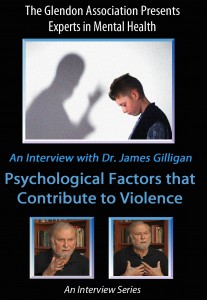
The following videos and transcripts are part of an exclusive interview series with Dr. James Gilligan and Dr. Lisa Firestone. Dr. James Gilligan is a renowned violence expert, and has contributed years of research to the treatment of some of California’s most violent prisoners. Additionally, he served as an expert witness in the litigation that was subject of the Supreme Court decision in Plata V. Brown.
Dr. James Gilligan on Love and the Soul
The human soul, the human psyche, needs love in order to survive, just as specifically as the body needs oxygen in order to survive. And for people who haven’t been starved for love, that may not be the first thing they would think of. I mean, we kind of take it for granted that we get love from a lot of people. But if you have lived in an environment where you were starved for that, you’re talking about a whole different range of experience. Just like with somebody who’s starved for oxygen, I mean, most of the time we don’t even think about the air we breathe, it’s just the air we breathe. But when somebody’s oxygen supply is cut off, you realize it’s life threatening in a very short time. Well, it’s the same with the prisoners. They were like people whose oxygen supply had been cut off, but it was their love supply. And I realized that without love, the soul cannot survive; it dies. And that’s what these men were telling me, that their souls had died. That’s why they were capable of killing other people.
Dr. James Gilligan on How Prison Worsens Violence
Most prisons do more to stimulate violence and crime than they do to prevent it. Prisons have often been called “schools for crime,” I’d call them graduate schools for crime. People often have to become violent in order to survive in them. Or, even if they’re not attacked by others, they are subjected to conditions of degradation and humiliation and intimidation and threats that I think might drive the most saintliest of people, you know, to become violent in response.
No One is Hopeless
I have seen the most violent people we have, and when I first started out with many of them, I thought they were hopeless. I thought there was nothing we could do, they were untreatable, incurable. What I discovered was I was wrong. I’ve known some of these men for 25 or 30 years now. People who were off the scale, who were mute, paranoid, multiple murderers, who’d been killing people even after they got into prison or jail, we were able to work with and turn around so that they haven’t harmed a hair on anybody’s head, you know, for that last 25 years, and are, in fact, engaged in constructive work. In the case of the extremes like I just mentioned, still, in a correctional institution, but, in other words, not harming anybody and not harming himself, even after he had a history of killing people within the jail. So what I’m saying is you can take the most hopeless cases and my recommendation is don’t give up on anybody. There is no human being who cannot be reached at some level or another if you have the dedication and the patience and you’re willing to think of it as something that has to go on sometimes, not just for months or years, but for decades. Human beings, even dead souls can be resurrected. And we can learn something from that. We’re not just doing this to be good Samaritans, to, you know, these poor murderers. We are doing it also because it helps the entire human race, it helps all of us if we can learn what causes violence and how we can prevent it. And we can only learn it, I think, ultimately, from the most violent people.
Dr. James Gilligan on Education Halts Recidivism
There are several things that we do know about this that I think are worth sharing. One is that study we did in the Massachusetts prisons to find out what programs had been most effective in preventing recidivism or re-offending among prisoners after they left the prison and returned to the community, we found one program and only one that was 100% successful in preventing recidivism. And that was the prisoner getting a college degree while in prison. For a 25-30 year period – actually, it is much more than 30 years now – professors from Boston University and other local colleges and universities have been teaching courses in some of the Massachusetts prisons for which the prisoners are granted a degree giving credits by the university. And we followed several hundred prisoners who had received a bachelor’s degree, or in some cases, a master’s degree while in prison. We followed their performance after they left prison and returned to the community. Over a 25 year period, we found not one individual who had committed a new crime and been returned to prison. And I thought at first, we had just missed somebody. But then I discovered that the state of Indiana reported exactly the same result; the Folsum State Prison in California reported the same result. Then we extended the study to 30 years and we found two people who had been returned to prison. But that was a recidivism rate well under 1%. Compare that with the average recidivism rate throughout the United States among the state prisons after people leave the prison. It’s 65% recidivism after three years. We’re talking about less than 1% over a 25 year to 30 year period.
Dr. James Gilligan on Solving Violence
I treated the violent prisoners in the prisons as my teachers and I was their student in my effort to learn what caused them to become violent. And they would teach me. I just had to listen to them. I had to pay attention. If we don’t take that attitude of wanting to learn from them, then we lose a golden opportunity to learn how to solve what I think is arguably the most serious public health problem our society, in fact, our species, faces. I mean, if you think about it, the human propensity to commit just unlimited degrees of violence is the most direct threat to the continued survival of our species.
Dr. James Gilligan on Psychotherapy
One reason that psychotherapy and psychoanalysis, when they are properly conducted are such powerful forms of showing respect to another human being. When a therapist is giving his full attention to one person, without distraction, and saying, “What you’re telling me is so important, I will push everything else out of my attention and pay attention to you.” You are showing that person respect.
Dr. James Gilligan on a Human’s Response to Trauma – Ego Disintegration
So, [the person facing trauma responds in this manner:] “I’m just going to disassociate from that person who’s going through this and I’ll be like I’m somebody else and I’m looking on. But I can’t tolerate the horror, and the fear and the pain that I am going through.” Now, obviously this is not a, either a conscious process or a voluntary one. I’m talking about automatic survival mechanisms that the human psyche engages in, in order to survive levels of trauma that would just obliterate the self immediately. I mean, people, they couldn’t function. I would say the deepest fear that human beings have as I have seen it, as I have observed it over the years is the fear of the disintegration of the self.
Dr. James Gilligan on Violence
The main social and economic causes of violence – and I’ll add political causes – are those that divide the population into the superior and the inferior, the strong and the weak, the rich and the poor. The more highly unequal a society is, the higher its rates of violence. For example, the most powerful predictor of homicide rates throughout the world – and this has been repeated in dozens of studies – is the size of the gap between the rich and the poor. The greater the degree of economic inequality in a society, the higher the murder rate, the lower the inequality, the lower the murder rate. For example, in the world today, the countries with the lowest rates of economic inequality, or, in other words, the highest rates of equality, are the countries of Western Europe, Japan and the other English speaking democracies – Canada, New Zealand, Australia. They have the lowest rates of inequality and they have murder rates that are, in most years, well in Western Europe and Japan are roughly one-tenth of ours. And the other English speaking democracies are about one-fifth of ours, 20% as high. In other words, the US murder rates are 5-10 times higher than that of any other economically developed country on earth. Now, one reason for that, the United States also by far the highest degree of economic inequality of any developed economy in the world. The two go together. In the third world countries, the so-called developing countries, although in many cases, these are what I would call un-developing countries or regressing countries, because many of them are actually becoming more poverty stricken rather than less. But in many of those countries, the rates of inequality are even higher than they are in the United States. I mean in many of the third world countries, the population is really divided between a tiny elite of super rich landowners and a huge population of semi-starving peasants. And they do have higher rates of violence than we do. I mean, the World Health Organization, with whom I have worked for many years, has done really path breaking, epidemiological research on this and has shown that the highest rates of violence of all are found in the third world countries. By the way, this applies to warfare as well as to homicide. It’s true with both interpersonal violence and collective political violence. So, achieving a greater level of equality is important. In fact, it’s essential. The US, I can’t emphasize it too strongly, has the highest rates of violence in the developed world today. It’s important for us, I think, to learn from that about what is not working in our society. As I said, I’m a doctor and I approach this as a problem in public health and preventive medicine.
Dr. James Gilligan – Punishment Does Not Prevent Violence
Prisons now are based on, among other things, but this is a major component, they’re based on the notion that somehow punishment is a good thing. The assumption here is that when somebody’s done something bad, the only way we can teach them not to keep doing that bad thing is to punish them and that will teach them. The fact is, we know that that is exactly the opposite of the truth. We have abundant evidence, many different lines of evidence showing that punishment does not inhibit or prevent violence. On the contrary, punishment is the most powerful stimulant of violence we’ve discovered yet. But I’m making a very important distinction here between punishment and restraint. As I’ve already said, I do believe that we need to restrain people who are dangerous to others by isolating them in a locked, secure facility. But not isolating them in another sense. Because we would want them to have full access to educational and therapeutic personnel who would come into the prison and, by the way, in my ideal therapeutic prison, I would of course invite the families and the wives and girlfriends to come in for conjugal visits, for family visits. I would try to give these men every possible chance to maintain familial ties as ling as they were behaving constructively toward the members of their families.
Order PsychAlive’s DVD Interviews with Dr. James Gilligan:
 In this DVD, Dr. James Gilligan discusses the developmental roots of violence, such as the psychological effects of childhood neglect and dissociation. Drawing upon his wealth of experience working with violent adolescents and adults, Dr. Gilligan addresses implications for treatment and emphasizes the importance of learning from violent individuals, stating, “We need to learn from them what are the causes of violence and what are the interventions that can prevent it.”
In this DVD, Dr. James Gilligan discusses the developmental roots of violence, such as the psychological effects of childhood neglect and dissociation. Drawing upon his wealth of experience working with violent adolescents and adults, Dr. Gilligan addresses implications for treatment and emphasizes the importance of learning from violent individuals, stating, “We need to learn from them what are the causes of violence and what are the interventions that can prevent it.”
See this DVD and more at Glendon.org
Read More from Dr. James Gilligan
 Dr. James Gilligan, M.D., is a Clinical Professor of Psychiatry in the School of Medicine, Adjunct Professor in the School of Law, and Collegiate Professor in the School of Arts and Science at New York University. He is a former president of the International Association for Forensic Psychotherapy. He is the author of Violence: Reflections on a National Epidemic, Preventing Violence: Prospects for Tomorrow, Why Some Politicians Are More Dangerous Than Others. As a faculty member of the Harvard Medical School for many years, he headed the Institute of Law and Psychiatry, and directed mental health services for the Massachusetts prisons and prison mental hospital. He served as an expert witness in the litigation that was the subject of the Supreme Court decision in Plata V. Brown.
Dr. James Gilligan, M.D., is a Clinical Professor of Psychiatry in the School of Medicine, Adjunct Professor in the School of Law, and Collegiate Professor in the School of Arts and Science at New York University. He is a former president of the International Association for Forensic Psychotherapy. He is the author of Violence: Reflections on a National Epidemic, Preventing Violence: Prospects for Tomorrow, Why Some Politicians Are More Dangerous Than Others. As a faculty member of the Harvard Medical School for many years, he headed the Institute of Law and Psychiatry, and directed mental health services for the Massachusetts prisons and prison mental hospital. He served as an expert witness in the litigation that was the subject of the Supreme Court decision in Plata V. Brown.

